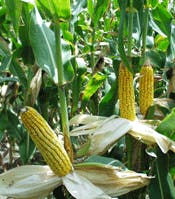As attention turns more and more toward using corn and other products to produce ethanol for fuel, experts warn that increased production of these crops could pose a threat to the nation's water supplies.
Both water quality and the availability of water could be threatened by sharply increasing crops such as corn, said Jerald L. Schnoor, professor of environmental engineering and co-director of the Center for Global and Regional Environmental Research at the University of Iowa.
Schnoor is chairman of a National Research Council panel that studied the potential impact of increased use of biofuels on water supplies. A stated goal is to increase biofuel production about six times, to 35 billion gallons by 2017, Schnoor said.
"That would mean a lot more fertilizers and pesticides" running into rivers and flowing into the oceans, he said in a telephone interview.
Available water depends on where the crops are grown, he added. If it is an area needing irrigation, it takes 2,000 gallons of water for every bushel of corn. And that's in addition to the secondary issue of how much water is needed by the factories that produce the ethanol, he said.
What is needed is a breakthrough in technology so that ethanol can be produced from cellulose such as grass, wood and sawdust, Schnoor said. "If we could do that it would be much better environmentally."
Supplies are already stressed in some areas of the country, including a large region where water is drawn from the underground Ogallala aquifer, which extends from west Texas up into South Dakota and Wyoming.
Source: Associated Press/AP Online


